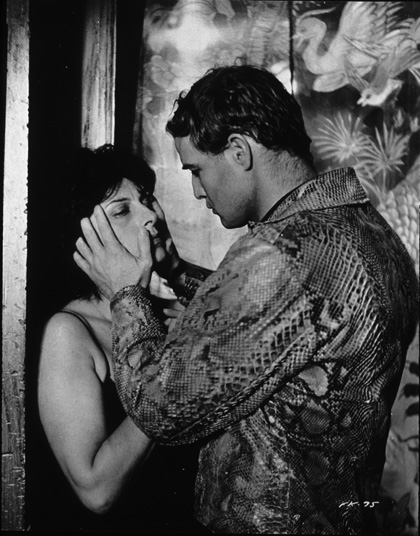Primary navigation


Brando lights the emotional touchpaper in Sidney Lumet’s Tennessee Williams adaptation. By Tim Lucas
The Fugitive Kind
Sidney Lumet; US 1960; Criterion; 121 minutes; Aspect Ratio 1.66:1; Features: new Sidney Lumet interview; ‘Hollywood’s Tennessee and the Fugitive Kind’ featurette; 1958 ‘Kraft Television Theatre’ episode ‘Three Plays by Tennessee Williams’
As one of the few serious dramatists willing to serve the devils of Hollywood, Tennessee Williams overcame the commercial limitations of his baroque Southern Gothic universe to become arguably the most popular playwright in the world. Major motion pictures based on his dark plays about troubled passions, such as A Streetcar Named Desire (1951), The Rose Tattoo (1955) and Suddenly, Last Summer (1959), were instrumental in making the cinema more available to adult subject-matter and systematically disabling the wholesome stranglehold of the Hays Code. Such became the appetite of the movies for anything bearing his name that, for this film, director Sidney Lumet turned to a recent (1957) but unsuccessful Broadway production, Orpheus Descending, in fact a rewrite of Battle of Angels, a piece of unproduced juvenilia written when Williams was not yet 30. The resulting film, scripted by Williams and Meade Roberts, is a remarkable triumph over the odds, with a first-rate cast and crew cutting through the lingering youthful pretensions of the material to wellsprings of noble aspiration and palpably violent emotion.
Marlon Brando stars as Valentine Xavier, a snakeskin-jacketed, Rolex-wearing troubadour who travels with a guitar as his life’s companion, allegedly given to him by Leadbelly and signed by such notable ‘jazz’ musicians as Blind Lemon Jefferson. Introduced in a six-minute take originally not part of the shooting script, an apologetic Val stands before a New Orleans judge and sincerely talks himself out of a jail sentence following an arrest at a party of apparently unspeakable revelry. Abandoning the nightclub life that laid him low, he follows a job recommendation to a small town where he becomes a suit-wearing salesman for a mercantile store run by Lady Torrance (Anna Magnani, Oscar-winner for The Rose Tattoo), the lonely wife of an angry, cancer-riddled husband (Victor Jory) whose cane-strikes against the floor of his sickroom underscore her unmet needs as well as his own. Val innocently disrupts the inner lives of the local womenfolk much as Terence Stamp later would in Teorema (1968), his presence exciting their dreams, facilitating them emotionally and making them more urgent sexually. In the case of the sheriff’s wife Vee Talbot (Maureen Stapleton, who played Lady Torrance on Broadway), he inspires her as an artist to the point of literally blinding her with a religious vision. Attracted more to his snakeskin jacket and legendary wild ways is local rebel socialite Carol Cutrere (an outrageous Joanne Woodward – imagine Courtney Love cast as Medea), who is looking less for love than for new ways to cattleprod her sleepy town. In time, Val finds himself emotionally drawn to Lady, healing the older woman with love and physical intimacy while helping her put the finishing touches to a new confection shop, a life’s dream meant to ease the trauma of how her father’s similar place of business was burned to the ground by racist rabble-rousers. Everyone’s collective dreams and demons are piled high as a prelude to the biggest bonfire the town has ever seen.
Brando has chiselled Orphic perfection in his countenance but is hardly convincing as a musician; one suspects that he patterned his performance on Elvis in his Southern gentlemanly mode. Even with his sustained centre-stage introduction, the fireworks of Woodward’s performance and the bravura nature of Boris Kaufman’s cinematography, the film doesn’t quite find its full galvanising strength until Brando crosses swords dramatically with Magnani. Her magnificence – beautiful, brittle yet immovable, eyes like proverbial shattered mirrors – goads Brando into some of his finest work, particularly in the scenes where they fight to connect through barriers of hurt and pride, and in the sublime soliloquy where he likens himself to a bird forever riding the wind, wherein Kaufman subtly alters the set lighting to lend magic to the moment when Brando’s craft finds release into effortlessness (after 32 takes, Lumet reveals in the interview included in the extras).
Criterion presents The Fugitive Kind in a lustrous black-and-white transfer that fully immerses the viewer in an experience equally cinematic (Lumet calls Kaufman’s unreal lighting “the poetic equivalent of the [play’s] language”) and theatrical (with the camera sometimes turning a full 360 degrees as Woodward runs amok). Surprisingly, no theatrical trailer is offered, but the second disc of extras is splendidly supportive of the feature. A half-hour interview with Sidney Lumet, looking at 85 no older than he does in promo shorts from 30 years ago, speaks lucidly about the joys and difficulties of making the film, attending as much to his memories of the actors (he speaks of Brando only in the present tense) as to the film's technical challenges. ‘Hollywood’s Tennessee and The Fugitive Kind’ (27 minutes) interviews authors Robert Bray and R. Barton Palmer about the period of Williams’ Hollywood vogue and the specifics of The Fugitive Kind, pointing out that Valentine Xavier is an archetypal Lumet protagonist as well.
Finally, ‘Three Plays by Tennessee Williams’ is an hour-long 1958 broadcast of David Susskind’s ‘Kraft Television Theatre’, in which Williams himself introduces a trio of one-act plays, Moony’s Kid Don’t Cry, The Last of My Solid Gold Watches and This Property Is Condemned. All three kinescoped playlets were directed (superbly) by a 33-year-old Lumet, who acquits himself in this rewarding package as arguably the most passionate interpreter Williams’ work ever had.
Brothers in harm: Sidney Lumet talks to Geoffrey Macnab about Before the Devil Knows You're Dead (February 2008)
Inflammable desires: Tony Rayns on Kenneth Anger’s ‘Magick Lantern Cycle’ (July 2009)
Tideland reviewed by Mark Sinker (September 2006)
Women, windmills and wedge heels: Paul Julian Smith on Pedro Almodóvar’s Volver (June 2006)
Gloria reviewed by Chris Darke (August 1999)